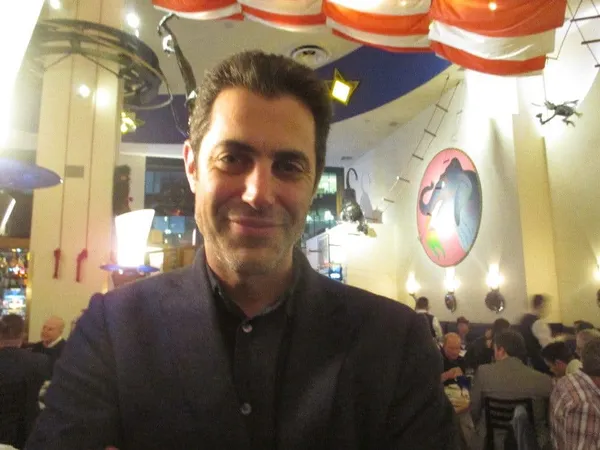 |
| Spotlight screenwriter Josh Singer at Circo Photo: Anne-Katrin Titze |
Tom McCarthy's Spotlight has Michael Keaton, Mark Ruffalo, Rachel McAdams, Brian d'Arcy James and Liev Schreiber team together to investigate allegations of child abuse committed by Catholic priests. Billy Crudup, John Slattery, Stanley Tucci, Len Cariou, Neal Huff, Jamey Sheridan, Michael Cyril Creighton and Jimmy LeBlanc round out the terrific ensemble, with the voice of Richard Jenkins as Richard Sipe.
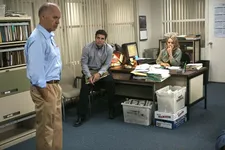 |
| Michael Keaton, Mark Ruffalo and Rachel McAdams |
At the Spotlight dinner hosted by Bobby Cannavale, Laura Linney, Kelli O’Hara and Christian Borle with Candice Bergen attending, screenwriter Josh Singer praised his producers Nicole Rocklin and Blye Pagon Faust, costume designer Wendy Chuck and production designer Stephen H. Carter. Unlike the team behind Alan J. Pakula's All The President's Men, which had Carl Bernstein and Bob Woodward's book as a primary source, the Spotlight team had to do the research themselves.
The former Miami Herald executive editor Marty Baron (a very convincing Liev Schreiber) arrives without much introduction or fanfare to take over The Boston Globe as new editor-in-chief. After an informal chat with deputy managing editor Ben Bradlee Jr. (Slattery, understatedly impeccable), he shrewdly plays it low-key by next setting up a meeting with Walter 'Robby' Robinson (Keaton) at a restaurant to discuss his role with the paper.
Robby is the Spotlight team leader of Mike Rezendes (Ruffalo, all shoulders and fringe, resembling a hyper Franciscan monk) and Matt Carroll (d'Arcy James, wonderfully mild-mannered) and Sacha Pfeiffer (McAdams who has never been better). Baron chooses them to expose the powerful, entrenched system.
When Marty Baron has his mandatory meeting with Cardinal Law (Cariou), he learns a few things about what is expected of him and is given a package, gift wrapped in gold paper with a wine-red ribbon.
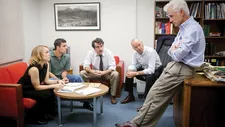 |
| Rachel McAdams, Mark Ruffalo, Brian d'Arcy James and Michael Keaton as the Spotlight team with John Slattery at The Boston Globe. |
Anne-Katrin Titze: Catechism, 4th edition, paperback.
Josh Singer: Yeah?
AKT: Who came up with that gift? Is that the actual present from Cardinal Law or your invention?
JS: It is an almost perfect copy. We have the actual edition which Marty [Baron] gave to me and which I have. We couldn't use the actual one because we didn't own the rights to it. The one we had had a green cover and I believe the one the props guys made had a red cover. The books looked almost exactly the same.
AKT: Who came up with the idea to include it? It's a wonderful moment in the film.
JS: Marty was actually given the Catechism. I believe he told me that he said it was A Cardinal's Guide to Boston - I'm not exactly sure if that's how he remembers it now, but he told us that he was given this gift. In reality, the Cardinal gives him the gift, which we thought was just amazing. We had to get that into the movie.
AKT: You were very clear not to have flashbacks from the get go?
JS: You know, we thought about it. I'd say the one area where we really thought about it was where Michael Cyril Creighton, who is playing Joe Crowley and Jimmy LeBlanc who is playing Patrick McSorley, they're both telling their stories. And we were never going to flash back to the actual molestation. But there were two images in those stories which were really powerful. One where Patrick McSorley talks about this ice-cream melting down his arm and one where Joe Crowley talks about this children's mobile with names on it. In the very first draft I wrote flashes to those things, just to those images.
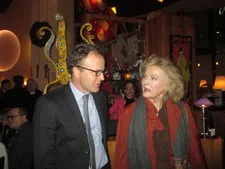 |
| Spotlight director Tom McCarthy with Candice Bergen Photo: Anne-Katrin Titze |
AKT: Because they are very strong childhood images?
JS: Because they're powerful. And I think Tom [McCarthy], he was so all about verisimilitude in terms of what we're presenting. And also he's a great believer in actors. He said, look, I'm going to get two great actors and lets let the words and the actors do the work.
AKT: And Wendy Chuck!
JS: Right. And Wendy Chuck and the costumes. And the production design by Steve Carter and lets all of that do its work. So we took it out and it worked pretty well.
AKT: I asked Tom McCarthy and I want to ask you as well. What took you so long?
JS: You know, from the time I signed on board, it was about three years. It wasn't that long.
AKT: The question itself, is the central question of the movie, isn't it?
JS: It is. I would say for us as creators, there wasn't a book. It wasn't like for Pakula's All The President's Men, there was a book that was written [by Carl Bernstein and Bob Woodward], which detailed the investigation. There was no book that detailed the investigation. There was no primary source material so it was really a matter of our enterprising producers Nicole Rocklin and Blye Faust who heard about the story and then went and got the life rights to the reporters and then they had to find the right team and they found Tom.
And then Tom hired me and we really had to go up and we used one of these recorders [pointing to the one I am holding in my hand] and literally spent out entire time using these recorders. I have tapes and tapes of everyone we talked to. First all the reporters and then almost everyone you see in the film we talked to. That process took us six months just to research everything. And once we had a draft we were still doing more research.
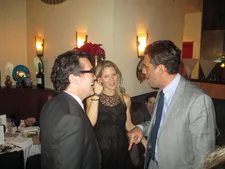 |
| Brian d'Arcy James with co-hosts Kelli O'Hara and Bobby Cannavale Photo: Anne-Katrin Titze |
We didn't talk to Eric Macleish and find out about the 20 priest story until we were a year into a draft. It was a very organic process of continuing to go back once we had a draft. We kept re-circulating that draft to all the reporters. And we had Robbie and Mike - we trapped them in a room for a day and went over every line. We very much wanted to feel real and get the reporting right. Get the survivors right.
AKT: How much did the timing with 9/11 play into the story? I have never seen 9/11 used this way - as an aside and almost a hindrance to a story. It makes sense and makes it feel very real.
JS: We debated putting in 9/11. It was one of those things where an ordinary narrative would have just played through and not included it. But it was such a presence and it took him off the story for a month and a half. How do you not include it? I'd say 9/11 does a couple of things for us. One, it lets us show the Cardinal being a good Cardinal and saying the right things. You know, being someone who was there at a time when people needed him.
I think very much the religion does that and in that moment the Cardinal did that. We thought it was only fair to show that. We get to show how when they're taken off the story, the reaction of Phil Saviano, who, like, sees this happening again: "This is what has happened to me before. You're dropping me. You're dropping the story." And see that pain- we thought that was important. Also, I think, in some ways, oddly enough, 9/11 was a preparation for these guys. And for the whole world.
AKT: 9/11 as preparation for the world?
JS: I mean, it changed how we looked at the world. I can't imagine being a Catholic in Boston at the time. Everything you think about how the world was changed in terms of your government. And everything you think how the world works in terms of your religion changed by this article. It must have been very challenging. It's almost like we all grew up a little bit. In some ways maybe we were more receptive and ready for this story.
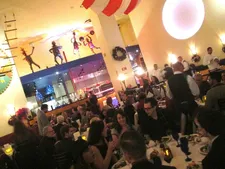 |
| Spotlight dinner at Circo Photo: Anne-Katrin Titze |
AKT: The Catholicism - I suppose you are not Catholic…
JS: I am Jewish, Tom is Catholic. In that way, we're sort of a good pairing. Marty is Jewish, the rest of the team is Catholic. Tom and I, neither of us has a beef with organised religion per se. I know Tom thinks about Catholicism in a good fashion. I don't practice as much as I should. But I hope to and think of myself as a Jew who believes in the religion. And we were never out to get Catholicism per se.
We talked about it a lot like how Sipe talks about it in the movie and how Sipe talked about it with us. When we first sat with Sipe, I said "Do you still consider yourself a Catholic?" He said "I do." And I was surprised. And he said "Look, I don't go to church much anymore, I'm not really welcome there. The institution is made of men. Men make mistakes the institution is passing. My faith is in the eternal and I try to separate the two."
AKT: Have you seen Son Of Saul by László Nemes?
JS: I haven't, yet. I hear it's amazing. We've run into the director and the actor at Telluride. I've been dying to see it, It's just we've been pretty busy. I hear it's an amazing, gut-wrenching film.
AKT: You should come and see it this Friday at Lincoln Plaza. I am going to have a post-screening discussion with the actor, Géza Röhrig.
JS: Oh, really? Maybe my wife and I will come. I hear it's harrowing.
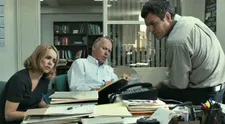 |
| Spotlight team Sacha Pfeiffer, Walter 'Robby' Robinson and Mike Rezendes listen to the voice of Richard Jenkins as Richard Sipe |
AKT: The film takes you to a place where you don't want to be and yet have to go to. In a way, your film is doing that too. The confusion at the beginning of Spotlight is a great start. The children, the crayons, the priests - something is wrong but we don't know what it is.
JS: I think in some ways, it's the whole film in a scene, right? That beginning in some ways tells you everything about what's to come. It tells you a lot about the town, frankly, and the way Boston works. Ty Burr wrote a really lovely article today, that's, I believe front page of The [Boston] Globe today, just about the film and how it tries to capture this complicity, this deference and this clannishness in Boston.
It pops up in a lot of places…I think what a lot of people don't think about is, a lot of people around the church were enabling the church. We weren't putting our hands up, we weren't saying, 'wait, stop this.' I think that responsibility is on all of us. That's part of why a newspaper and journalism is so important because they are one of the few organisations that actually do stand up and try to hold powerful institutions accountable.
Coming up, Tom McCarthy, Brian d'Arcy James and our co-host Bobby Cannavale.
























